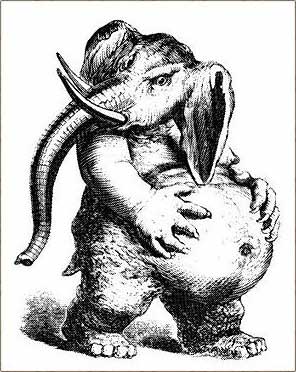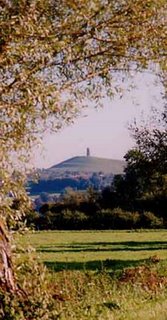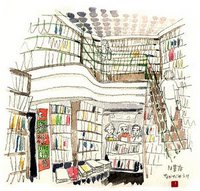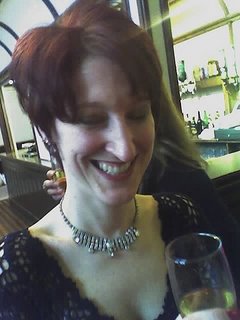Heyeroines in need of a slap
22.
Sarah Thane (
The Talisman Ring)

When I first started this series of character
assassinations studies I was conscious that one or two of my subjects would arouse particularly strong emotions among those who refuse to have any fault imputed to their particular idol. I suspect that Miss Thane is one such icon of heyeroinedom, so I should perhaps tread lightly. I should, but that doesn't mean that I shall. I will, however, attempt to be thorough. I will lay out the evidence, but it is for you to draw your own conclusions.
A careful study of Miss Thane's behaviour in chapter one of
The Talisman Ring is not, it must be said, particularly illuminating. This is because she never shows. Nor does she feature in chapter 2 nor chapter 3. Once we get to chapter 4 we discover the reason for this. She has overslept and missed the start of the story. Laziness, or something more sinister? We shall return to that particular point later. For now I shall simply note that had the oh-so-sensible Miss Thane done the sensible thing, and been up and about in the early pages, Ludovic might not have been shot, and we would have escaped the worst of Mademoiselle de Vauban's histrionics. And yes, Eustacie may be a rather over-imaginative young woman, but at least she is professional enough to show up in the first chapter.
Having finally appeared, if not having bothered to get dressed, Miss Thane gives every impression of being one of those people who think that the best way to make up for being late is to talk and talk until we rather wish she hadn't made the effort after all. At the same time she wants to talk in such a variety of registers that we are astounded by her versatility. Within the first three pages she speaks "placidly", "imperturbably", "earnestly", "regretfully", "meekly" and "encouragingly". It is hardly surprising that there is a great scarcity of adverbs in contemporary dialogue tags with Miss Thane's liberal deployment of them here. At least we have a good idea what Heyer means by Miss Thane having "a generous mouth".
This is not the only aspect of Miss Thane's generosity that we become aware of. She is also very free with her hartshorn and her basilicum powder. Quite a travelling pharmacopeia is our Miss Thane. Now why should that be?
Heyer also describes Miss Thane as "sensible", and this is, I know, very much the perceived wisdom, but is she
really sensible? The evidence points the other way, and does so even if one ignores her wilful encouraging of poor Mademoiselle de Vauban's morbid fascinations.
Let us take the critical topic of interior decoration. Miss Thane appears to be woefully ignorant on all aspects of cartouches, caryatids and scratch-mouldings, let alone strap-and-jewel work. She probably wouldn't recognise silver-figured oak wainscoating if you nailed it to the walls all around her. Such deficiencies are always regrettable, but can usually be disguised by the deployment of diversionary tactics - fainting fits, megrims, cornflower blue eyes, that sort of thing. Far from adopting such an approach, Miss Thane (grey eyes, but she could surely improvise) throws herself into an elaborate scheme whose success depends absolutely upon her having expertise in precisely this area. Is that sensible, or behaviour more to be expected from one under the influence of... but I get ahead of myself.
Let us instead consider Miss Thane's role in that critical scene where Ludovic is about to be discovered by Mr Stubbs, the Bow Street Runner. Except that she plays no role at all. She has gone out for a "sedate" walk with her brother. Of course I am not going to suggest that anybody read any significance into the word "sedate". Not at all. At least, not yet.
But while Miss Thane was off being "sedate", it was left to Ludovic Lavenham to improvise the obligatory cross-dressing masquerade scene without which no Heyer romance is really complete. He makes a reasonable enough fist of it, but nobody can deny that had Miss Thane been present it would have run more smoothly. Yet it is she who kicks up a fuss about the loss of her "French perfume". Sensible? I think not.
Nor is it sensible to wander about at night in the middle of February in the belief that one is being caressed by balmy breezes on the way to a romantic tryst with a man that she has frequently described as having not a romantic bone in his body. Not sensible, but possibly understandable if one ha been indulging in... but, let us see this through to the end.
The Talisman Ring ends with great excitement, following the discovery of the ring itself. Sir Tristram is rushing off to London on the Night-Mail. Eustacie is in a state of high excitement. Where is Miss Thane? She is walking in a "leisurely fashion". She is slipping into "empty-headed femininity". She is subsiding in an "inanimate heap on the floor", where she misses the actual capture of the villainous Beau Lavenham.
It is perhaps that name that gives us a clue as to what is really going on here. The whole adventure never happened. It was all taking place inside Miss Thane's head. Far from being a witty romantic adventure,
The Talisman Ring is nothing more than the terrifying portryal of a vision in opium.
Not Lavenham but Laudanum? You must decide for yourselves.
Technorati Tags: heyeroines
 Pride and Prejudice is officially an Icon of England. It was one of 21 new icons added yesterday to the 12 original selections announced in January.
Pride and Prejudice is officially an Icon of England. It was one of 21 new icons added yesterday to the 12 original selections announced in January. I am tempted to nominate the Regency Period as an icon in its own right (I have already put in a nomination for The Archers). At present the early 19th Century is represented by P&P and by HMS Victory, so it may be pushing things to have an eleven year slice of history on top.
I am tempted to nominate the Regency Period as an icon in its own right (I have already put in a nomination for The Archers). At present the early 19th Century is represented by P&P and by HMS Victory, so it may be pushing things to have an eleven year slice of history on top.














